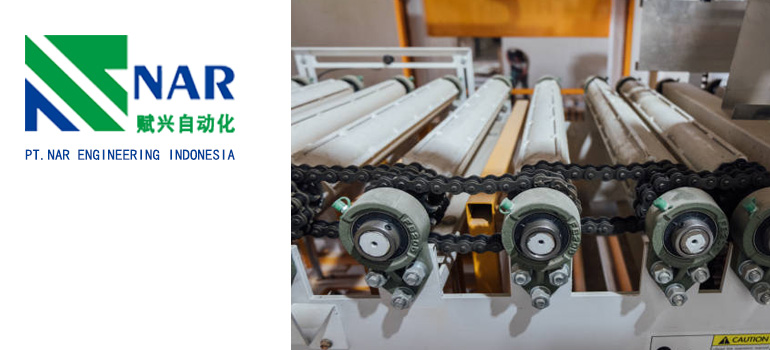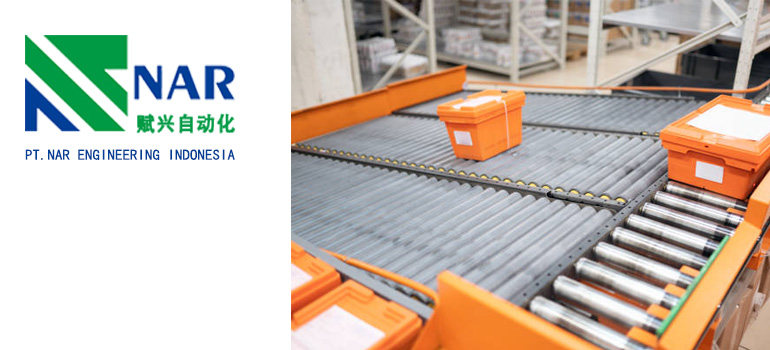Summary:
Powering Your Workflow: The Role of Motorized Roller Conveyors
How Motorized Roller Conveyors Streamline Material Handling
Key Components and Design Features of Motorized Roller Conveyors
Advantages Over Traditional Conveyor Systems
Applications Across Industries: Motorized Roller Conveyors in Action
In today’s highly competitive business environment, efficiency and process optimization are key factors for enterprises to achieve success. Understanding and utilizing motorized roller conveyor can not only improve productivity, but also reduce costs, and have a positive impact on the safety and comfort of workers.
How Motorized Roller Conveyors Streamline Material Handling
Motorized roller conveyor play a pivotal role in streamlining material handling processes across various industries. Let’s delve deeper into how these systems enhance efficiency:
Automated Transportation: Motorized roller conveyors automate the movement of materials within manufacturing facilities, warehouses, and distribution centers. With built-in motorized rollers, they eliminate the need for manual pushing or pulling of carts, bins, or pallets, reducing labor-intensive tasks and minimizing the risk of injuries associated with manual handling.
Flexible Configuration: These conveyors offer flexibility in layout and configuration, allowing for the seamless integration into existing production lines or material handling systems. They can be easily customized to accommodate different product sizes, shapes, and weights, enabling efficient handling of diverse materials ranging from small components to heavy-duty goods.
Precise Control and Speed Adjustment: Motorized roller conveyors provide precise control over the speed and direction of material flow. Integrated control systems allow operators to adjust conveyor speed, acceleration, and braking parameters according to production requirements. This level of control ensures smooth and consistent material handling, minimizing bottlenecks and optimizing throughput.
Accumulation and Sorting Capabilities: These conveyors are equipped with intelligent accumulation and sorting features, enabling the accumulation of products for buffering and queuing purposes. They can also facilitate diverting or sorting of items based on predefined criteria, such as destination, size, or barcode scanning. This enhances order fulfillment efficiency and reduces the risk of errors in picking and sorting operations.
Integration with Warehouse Management Systems (WMS): Motorized roller conveyors seamlessly integrate with warehouse management systems (WMS) and other automation technologies, such as barcode scanners and RFID systems. This integration enables real-time tracking and tracing of inventory movements, improved inventory accuracy, and enhanced overall visibility and control over material flow within the facility.
By streamlining material handling processes, motorized roller conveyors optimize workflow efficiency, reduce operating costs, and enhance overall productivity in manufacturing and logistics operations. Their versatility, reliability, and automation capabilities make them indispensable tools for modern material handling applications.
Key Components and Design Features of Motorized Roller Conveyors
Understanding the key components and design features of motorized roller conveyor is crucial for optimizing their performance and efficiency. Let’s explore these aspects in more detail:
Motorized Rollers: Motorized roller conveyors are equipped with individual rollers that contain built-in motors. These motorized rollers serve as the driving force behind the conveyor system, providing the necessary power to propel materials along the conveyor path. Each roller is driven independently, allowing for precise control over the movement and accumulation of materials.
Drive Systems: The drive system of motorized roller conveyors consists of motors, gearboxes, and drive shafts. These components work together to transmit power from the motors to the rollers, enabling smooth and efficient material transport. Variable speed drives are often used to adjust conveyor speed according to production requirements, while brake mechanisms ensure controlled stopping and positioning of materials.
Control Systems: Advanced control systems govern the operation of motorized roller conveyors, allowing operators to monitor and manage conveyor functions. Programmable logic controllers (PLCs) or computer-based control systems regulate conveyor speed, direction, and acceleration, as well as manage accumulation, sorting, and diverting operations. Integration with warehouse management systems (WMS) enables seamless coordination with other automated equipment and processes.
Conveyor Frames and Supports: The frame and support structure of motorized roller conveyors provide stability and rigidity to the system. Typically constructed from robust materials such as steel or aluminum, conveyor frames are designed to withstand the weight of conveyed materials and the forces exerted during operation. Support legs, brackets, and mounting accessories ensure proper alignment and elevation of the conveyor sections.
Safety Features: Motorized roller conveyors are equipped with various safety features to protect operators and prevent accidents. Emergency stop buttons, safety interlocks, and guards are installed at key access points to stop the conveyor in case of emergency or unauthorized access. Safety sensors and photoelectric beams detect obstructions and automatically halt conveyor movement to prevent collisions or jams.
Understanding these key components and design features allows for the effective implementation and operation of motorized roller conveyors in material handling applications. Proper maintenance and regular inspections ensure the reliability and longevity of conveyor systems, contributing to seamless workflow optimization and increased productivity.

Advantages Over Traditional Conveyor Systems
Motorized roller conveyors offer several advantages over traditional conveyor systems, enhancing efficiency, flexibility, and productivity in material handling operations. Let’s explore these advantages in more detail:
Energy Efficiency: Motorized roller conveyors are inherently more energy-efficient compared to traditional conveyor systems, such as belt conveyors or chain conveyors. By utilizing individual motorized rollers, power is only applied when and where it is needed, reducing energy consumption and operating costs. Unlike continuous-running systems, motorized roller conveyors can stop and start as needed, minimizing idle time and optimizing energy usage.
Modular and Flexible Design: Motorized roller conveyors feature a modular design that allows for easy customization and reconfiguration to meet changing production needs. Individual motorized rollers can be added, removed, or rearranged without disrupting the overall conveyor layout, providing flexibility and scalability for future expansions or modifications. This modular approach enables rapid deployment and adaptation to evolving production requirements, enhancing operational agility and responsiveness.
Reduced Maintenance Requirements: Compared to traditional conveyor systems with complex drive mechanisms, motorized roller conveyors have fewer moving parts and components that require maintenance. With fewer points of failure and reduced wear and tear, motorized roller conveyors offer higher reliability and uptime, minimizing downtime and maintenance costs. Additionally, self-diagnostic features and predictive maintenance capabilities allow for proactive maintenance scheduling, further optimizing equipment performance and longevity.
Precise Control and Positioning: Motorized roller conveyors provide precise control over material movement, speed, and positioning, enabling accurate product handling and placement. Integrated control systems allow operators to adjust conveyor speed, acceleration, and deceleration parameters to match production requirements and optimize throughput. This level of control ensures consistent product flow, reduces product damage, and enhances overall process efficiency.
Improved Safety Features: Motorized roller conveyors are equipped with advanced safety features to protect operators and prevent accidents in the workplace. Emergency stop buttons, safety interlocks, and guards ensure quick and easy access to emergency stop functions, allowing for immediate halting of conveyor operation in case of emergency or personnel safety concerns. Safety sensors and presence detection devices further enhance safety by detecting obstructions and automatically stopping conveyor movement to prevent collisions or injuries.
In summary, motorized roller conveyors offer significant advantages over traditional conveyor systems, including energy efficiency, flexibility, reduced maintenance requirements, precise control, and improved safety features. These benefits contribute to enhanced productivity, operational efficiency, and cost-effectiveness in material handling applications across various industries.
Applications Across Industries: Motorized Roller Conveyors in Action
Motorized roller conveyors find wide-ranging applications across various industries, revolutionizing material handling processes and enhancing operational efficiency. Let’s explore how these versatile conveyor systems are utilized in different industrial sectors:
Manufacturing Industry: In manufacturing facilities, motorized roller conveyors play a crucial role in streamlining production processes, facilitating the movement of raw materials, work-in-progress (WIP), and finished goods between different production stages. They are used for assembly lines, material transfer between workstations, and automated material feeding into CNC machines or robotic cells. Motorized roller conveyors ensure smooth, efficient, and continuous material flow, thereby optimizing production throughput and minimizing downtime.
Warehousing and Distribution Centers: In warehousing and distribution operations, motorized roller conveyors are employed for goods handling, sorting, and order fulfillment tasks. They enable the efficient loading and unloading of palletized or non-palletized goods from trucks, trailers, and containers, as well as the movement of goods within the warehouse or distribution center. Motorized roller conveyors are integrated into conveyor systems for receiving, picking, packing, sorting, and shipping operations, enhancing order accuracy, cycle times, and overall warehouse productivity.
E-commerce and Fulfillment Centers: With the rapid growth of e-commerce and online retailing, motorized roller conveyors are extensively used in fulfillment centers for processing and shipping orders. They facilitate the high-speed sorting, routing, and consolidation of individual items, cartons, or parcels, enabling quick and efficient order fulfillment. Motorized roller conveyors are integrated with automated sortation systems, barcode scanners, and label applicators to ensure accurate and timely order processing, thereby meeting customer expectations for fast and reliable delivery.
Food and Beverage Industry: In the food and beverage sector, motorized roller conveyors are employed for the hygienic handling and transportation of food products, containers, and packaging materials. They are designed with stainless steel construction and sanitary design features to meet strict food safety and hygiene standards. Motorized roller conveyors are utilized in food processing plants, bottling facilities, breweries, and dairy operations for conveying products such as bottles, cans, boxes, trays, and pallets, ensuring efficient material flow while maintaining product integrity and quality.
Automotive and Aerospace Manufacturing: Motorized roller conveyors are utilized in the automotive and aerospace industries for the handling and assembly of vehicle components, parts, and sub-assemblies. They are integrated into assembly lines, paint lines, and finishing processes for transporting components between workstations, machining centers, and assembly stations. Motorized roller conveyors support lean manufacturing principles by enabling just-in-time (JIT) delivery of components, reducing inventory holding costs, and improving production efficiency and flexibility.
From manufacturing and warehousing to e-commerce and food processing, motorized roller conveyors are indispensable tools for optimizing material handling operations across diverse industries, driving productivity, and enabling business success.

